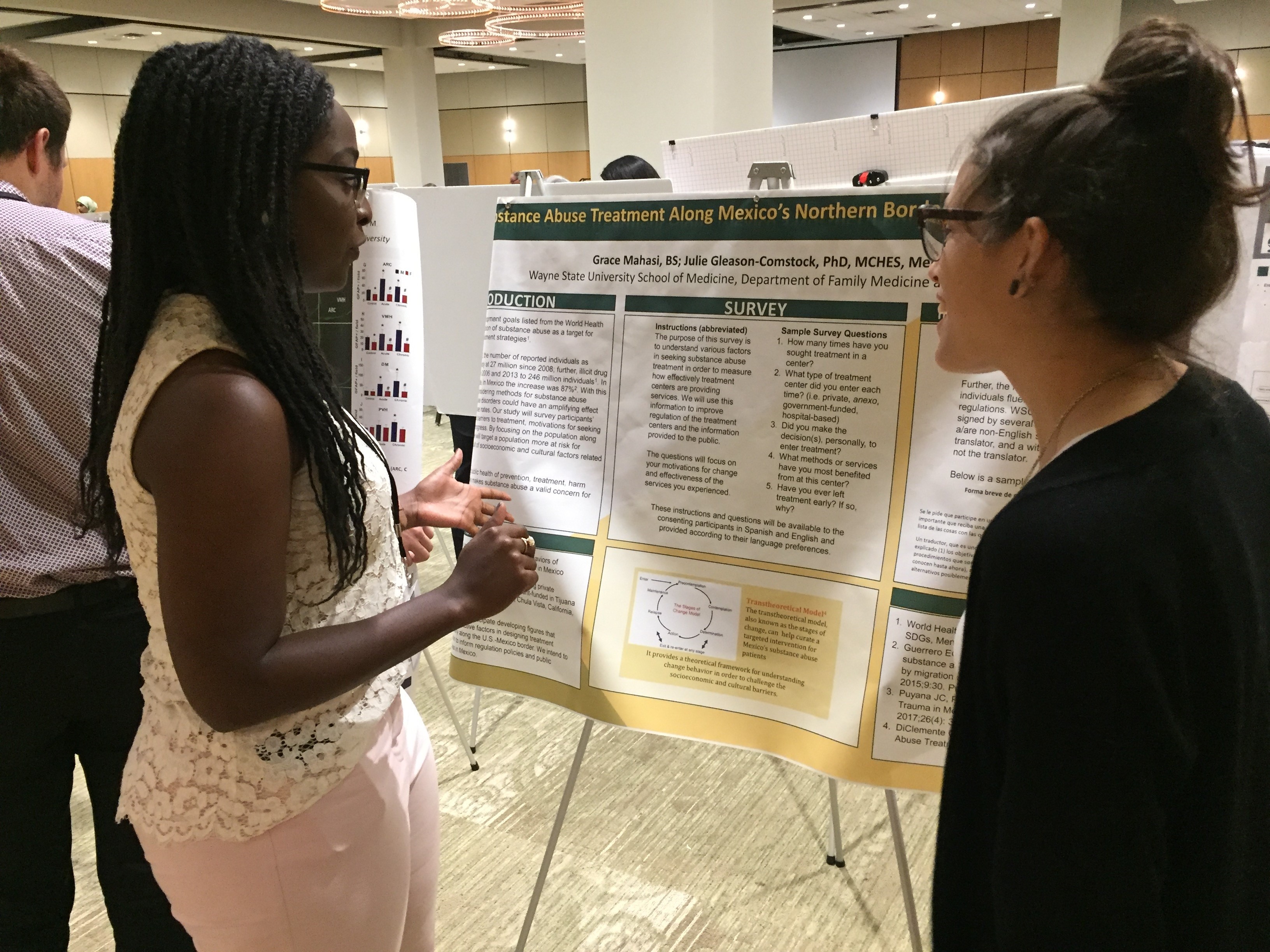Several Wayne State University School of Medicine faculty and students participated in the inaugural Wayne State University Global Health, Justice and the Environment conference, held Sept. 10-11 in the Student Center Ballroom.
Organizers accepted five posters from graduate students who attended the medical school’s FPH 7120 Global Public Health class in the Department of Family Medicine and Public Health Sciences, ultimately bringing classroom learning into the real world.

The class, taught by Assistant Professor Julie Gleason-Comstock, Ph.D., MCHES, introduced students to roles, relationships and resources influencing global public health, using a multidisciplinary approach to prevention and risk reduction. Abstracts were developed for an assignment on prospective approaches to addressing 2015-2030 World Health Organization Sustainable Development Goals.
“Students’ projects were insightful and demonstrated their ability to analyze global health challenges,” said Associate Professor of Emergency Medicine and Global Health Fellowship Co-Director Vijaya Arun Kumar, M.D., M.P.H., a class guest lecturer and conference attendee.
The conference was sponsored by the WSU Office of the Vice President for Research in conjunction with the Center for Urban Responses to Environmental Stressors, Healthy Urban Waters, Transformative Research in Urban Sustainability, the Graduate School and the Global Health Alliance.
“We have a shared interest in building capacity in global health. Research is a critical component of this effort. The important work we are doing is highlighted by several of the student presentations at the recent CURES conference,” said conference presenter and School of Medicine Assistant Dean of Global Affairs Marcus Zervos, M.D.
The conference focused on priorities needed for responding to environmental factors that impact human health, as well as the justice needed to expand beyond access to health care that includes a focus on issues such as air pollution, chemical pollution, water quality, food and drug safety, public health, childhood health and many environmental factors causing health differences.
Student Grace Mahasi’s poster, “Substance Abuse Treatment Along the Northern Mexico Border: A Survey Prospectus,” led her to reflect on the interdisciplinary nature of research and the “growing globalization of transnational relationships,” she said.
Fellow conference presenter Saher Yunus addressed the topic of “Canada and Road Injury: Young and Distracted Drivers” because traffic accident deaths are a major contributor to unintentional deaths. She noted traffic deaths “are quite common in third-world countries due to infrastructure issues,” but that she was also interested in the increase in deaths in developed countries.
Alymamah Mashrah’s topic, “Women in Ethiopia: A Proposal to Use Mobile Phone Apps to Reduce HIV Infection,” related to her strong interest in social determinants of women’s health and health education.
“With the growing use of mobile technology, I was interested to learn how we can use mobile phone apps to create health education programs to help reduce the risk of disease,” Mashrah said.
Sara Alosaimy approached “Improving Outcomes for Patients with Dual HIV and Neglected Tropical Diseases in Brazil by Enhancing Awareness of PreP” as an exploration of health platforms for reducing infectious disease.
Priya Spencer explored “Promotion of a Patient-Centered and Community-Driven Medical Model to Combat Multi-Drug Resistant Tuberculosis in China,” addressing barriers to the elimination of tuberculosis because of drug toxicity, length of treatment and disease burden. She observed the spectrum of research approaches presented at the conference could contribute to desirable public health outcomes.
Dr. Gleason-Comstock anticipates expanded participation in future activity at her department’s 2020 Research Day.
“The Wayne State University School of Medicine global health community has substantial student and faculty expertise,” she said. “Knowledge and presentation of the WHO Sustainable Goals provide a segue for expanding exploration and application of global public health competencies and research.”